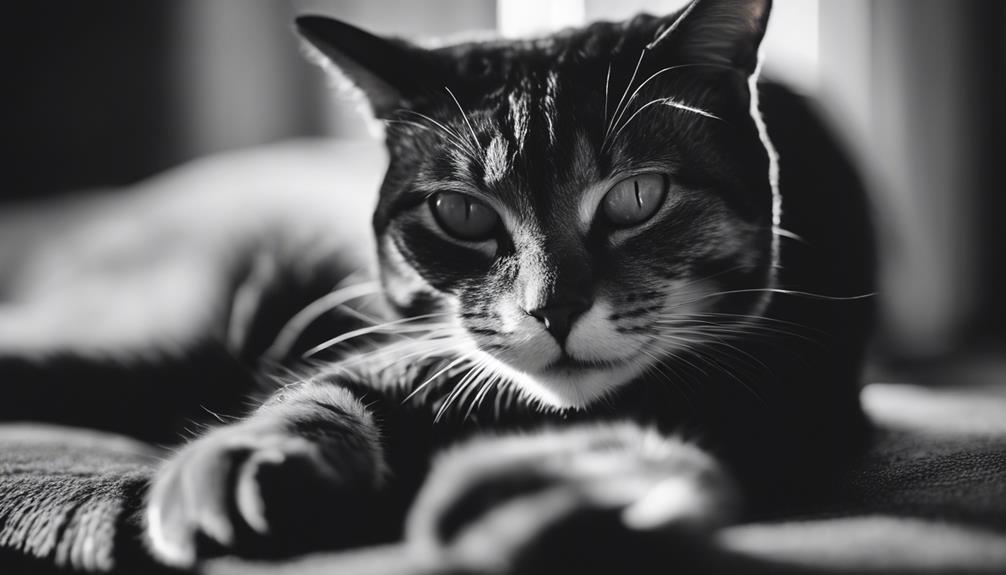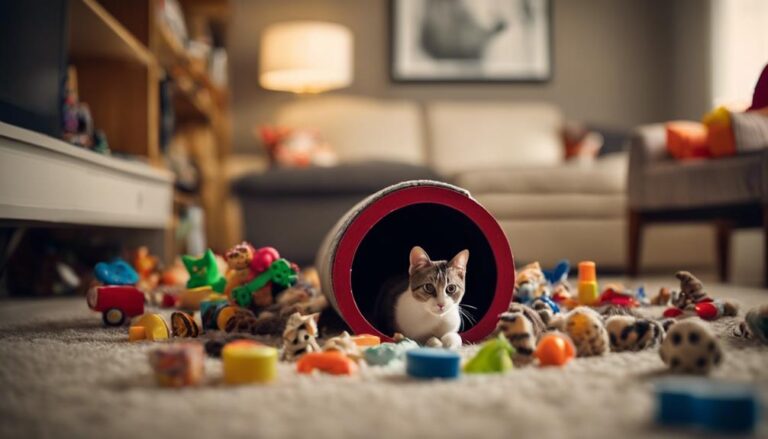When it comes to male cats, understanding their behavior goes beyond what meets the eye. From their territorial instincts to unique communication styles, male felines have a lot to uncover. Neutering plays a crucial role in shaping their well-being, but there's more to it than just that. So, before you make any assumptions, let's delve into the intricate world of male cats and discover what makes them truly fascinating creatures.
Male Cat Behavior Patterns
When observing male cat behavior patterns, it's evident that territorial instincts play a significant role in their actions. Male cats, especially when unneutered, may exhibit territorial behavior such as urine marking to establish their dominance and territory. This behavior is often a way for them to communicate with other cats and mark their presence in the environment. Neutering male cats can help reduce these aggressive tendencies and prevent them from spraying urine indoors to mark their territory.
In addition to territorial behavior, male cats can also display dominance behaviors like mounting or chasing other cats, particularly in multi-cat households. Neutering male cats not only helps in curbing these dominance behaviors but also reduces the likelihood of aggressive interactions and fights with other males.
Furthermore, neutering male cats can prevent unwanted litters and lower the risk of certain health issues such as testicular cancer, making it a beneficial choice for both the cat's well-being and the household harmony.
Neutering Benefits and Considerations
Neutering male cats not only benefits their health and behavior but also plays a crucial role in controlling overpopulation and reducing the risk of unwanted litters. This procedure helps prevent overpopulation by eliminating the possibility of male cats impregnating females. Neutering also reduces the chances of reproductive diseases in male cats, such as testicular cancer and prostate issues. In addition, neutered male cats are less likely to display territorial behaviors like spraying and aggressive mating behaviors.
Apart from preventing behavioral issues, neutering male cats can contribute to a longer and healthier life. Neutered cats tend to roam less, reducing their exposure to fights, accidents, and infectious diseases. Consult your vet to determine the best timing for neutering your male cat. Early neutering before sexual maturity is often recommended to maximize the health and behavioral benefits. By neutering your male cat, you not only improve his individual well-being but also contribute to the greater welfare of the feline population.
Common Health Issues in Male Cats
Male cats are susceptible to various health issues, including urinary tract problems, reproductive system concerns, and hormonal imbalances. These conditions can lead to discomfort, pain, and potential complications if left untreated.
Understanding these common health issues is crucial for maintaining your male cat's well-being.
Urinary Tract Problems
Male cats are at a higher risk of developing urinary tract problems than their female counterparts. Urinary tract issues often involve blockages that can lead to life-threatening conditions. Symptoms of urinary tract problems in male cats include straining to urinate, blood in the urine, and increased frequency of litter box visits.
Due to their narrower urethra, male cats are more prone to urinary blockages. To help prevent such problems, ensure your male cat has access to plentiful water and a balanced diet. Monitoring your cat's water intake and observing any changes in litter box habits can aid in early detection and treatment of urinary tract issues.
Reproductive System Concerns
Due to their unique anatomy, male cats face specific reproductive system concerns that can impact their overall health and well-being. Male cats are prone to urinary blockages, which can be life-threatening due to their narrow urethra. Testicular cancer is a significant worry in intact male cats, emphasizing the importance of neutering as a preventive measure.
Reproductive diseases such as prostatitis and testicular tumors can also affect male cats' health. Neutering not only helps prevent testicular cancer but also reduces aggressive and territorial behaviors, promoting a calmer and more sociable pet.
Furthermore, spaying and neutering male cats play a crucial role in addressing overpopulation issues by preventing the birth of unwanted litters of kittens.
Hormonal Imbalance Issues
Hormonal imbalances in male cats can lead to various health issues, impacting their overall well-being and reproductive functions. These imbalances may result in conditions like hyperthyroidism or diabetes, affecting their reproductive capabilities and overall health.
Testicular cancer is a prevalent health concern in unneutered male cats, often linked to hormonal imbalances. Neutering male cats is a proactive measure to prevent several hormonal imbalance-related health issues, including testicular cancer.
Regular veterinary check-ups are crucial for monitoring and managing hormonal imbalances in male cats, ensuring early detection and intervention when necessary. By staying vigilant and addressing hormonal imbalance issues promptly, you can help safeguard your male cat's health and well-being.
Understanding Male Cat Communication
Exploring how male cats communicate can provide valuable insights into their behaviors and emotions. Male cats use various forms of communication, including vocalizations like meowing, purring, hissing, and yowling. They also rely on body language, such as tail positions, ear movements, and facial expressions, to convey messages. Additionally, marking territory through urine spraying is a common method of communication among male cats.
Behaviors like kneading, rubbing, and grooming are also ways in which male cats communicate their feelings and establish bonds with other cats or their human companions. Understanding these communication cues is essential for strengthening the relationship between male cats and their owners.
Play and Exercise for Male Cats
To keep your male cat healthy and happy, daily play sessions are essential to ensure they stay active and engaged. Male cats thrive on interactive play, benefiting from toys like laser pointers and feather wands that stimulate their natural instincts. Engaging your male cat in play not only provides exercise but also helps prevent obesity and related health issues. Introducing climbing structures and hiding spots in your home can further encourage your male cat to stay active and playful.
Interactive toys and playtime serve as a vital part of bonding with your male cat. Regular play sessions create a strong connection between you and your furry companion, enhancing your relationship and providing mental stimulation for your cat. By incorporating play and exercise into your daily routine, you can ensure that your male cat remains physically and mentally healthy while strengthening the bond you share.
Bonding and Socialization With Male Cats
To strengthen your bond with your male cat, focus on daily interactions and positive reinforcement. Male cats thrive on affection and socialization, so make time for grooming sessions and interactive playtime. These activities not only help in bonding but also provide mental stimulation for your furry friend. When your male cat displays signs of affection such as rubbing against you or purring, reciprocate by giving chin scratches and gentle petting. Positive experiences like these reinforce the bond between you and your cat.
Socializing male cats from a young age is crucial for preventing behavioral issues and fostering a loving relationship. Encourage positive behaviors with treats and rewards, and gently correct any unwanted behavior. Building trust and mutual respect through consistent interaction and positive reinforcement is key to a strong bond with your male cat. Remember, each cat is unique, so observe your cat's preferences and adjust your bonding techniques accordingly to create a happy and fulfilling relationship.
Frequently Asked Questions
What to Expect From a Male Cat?
You can expect a male cat to be affectionate when neutered, exhibit territorial behaviors, and have a higher risk of urinary tract issues. Neutering reduces aggression and spraying, making them loving companions.
Do Male Cats Like to Be Held?
Some male cats enjoy being held, while others may prefer their independence. Respect their preferences, offer gentle handling, and positive reinforcement. Remember, each cat is unique, so observe and respond to their cues accordingly.
Are Male Cats Easier to Take Care Of?
Yes, male cats are generally easier to care for. Neutering can reduce aggression and territorial behavior. Their reproductive system is simpler, leading to fewer health issues. They are often more laid-back and affectionate, making bonding easier.
What Do Male Cats Act Like?
Male cats can be territorial, prone to spraying, and more independent. They tend to have larger facial features, are muscular, and may fight for dominance. Neutering helps reduce aggression and prevent mating.






